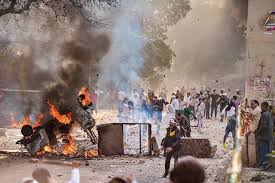EIGHT MONTHS AND STILL NO JUSTICE
- sakshamdewan11
- Oct 25, 2020
- 3 min read
Eight months ago, in February 2020, communal violence broke out in New Delhi. The riots took place over a span of six days majorly with a series of after-shocks all over the country. According to government data, the riots claimed at least 53 lives and injured more than 500 although according to third party data handlers the actual toll is significantly higher. During these six months, the Delhi police in their investigations have filed more than 750 FIRs and at least 200 charge sheets.
According to various media reports, until now, the Delhi police have arrested several students and named professors and human rights activists in their statements to the court. Its believed that the students, professors and human rights activists were instrumental in organising protests against the Citizenship Amendment Act (CAA) and were chief conspirators of the riots. It is believed that they engineered the violence to discredit the Government of India. One such student is Safoora Zargar, a pregnant woman who was booked under the draconian Unlawful Activities (Prevention) Act (UAPA) and sent to jail during the COVID-19 pandemic for her alleged role in the riots.
The Delhi police force was given a clean chit immediately after, however interviews of riot survivors, eye witnesses, lawyers, human rights activists and retired police officers brought out the conclusion that there was a pattern of human rights violations and rampant impunity.
There were reports of police brutality in university campuses in Delhi and the police’s inadequate response in preventing the riots and a pattern of torture and ill-treatment meted out on riot survivors and detainees by the Delhi police there were reports of harassment and intimidation of survivors and peaceful protesters too.
On March 24, 2020, the day the national lockdown was announced, the Delhi police filed an FIR against nine women protesters in Shaheen Bagh who were peacefully protesting while maintaining physical distance for disobeying an order by the public servant; obstructing a public servant in discharge of his/her functions and; assaulting and using criminal force to deter a public servant. Despite a case pending before the Supreme Court of India for removal of mass gathering from Shaheen Bagh, the Delhi police dismantled the protest sites across the city, concealed the anti-CAA art installations and cleared the graffiti.

One of the long list of HR violations that are being discussed is the Police’s failure to prevent the riots . According to Article 9 of the ICCPR everyone has the right to liberty and security of person and no one can be deprived of such liberty except in accordance with the procedure established by law. It provides that anyone arrested has a right to be immediately informed about the reasons for the arrest and must be promptly produced before a judge. This applies even if formal charges have not been asserted against a person. The inadequate response of the Delhi police to hate crimes committed during the violence manifested in various ways led to more damage that could’ve been prevented. Multiple interviews concluded that the police did not respond to the multiple calls that were made to 100 leaving the survivors to fend for themselves over the period of six days of violence in Delhi.
It was found that the behaviour of the police officers in many incidents during the violence in Delhi is a cause for concern as police officers either did not intervene despite being present or intervened only to arrest or attack the anti-CAA protesters and moreover refused to register complaints of the victims.
Delhi Police’s complicity and their failure to take control of the whole situation has led to the central leadership being questioned by the entire country. Under international law, in any case of death resulting from the use of force by law enforcement officers, regardless of whether it is suspected or alleged that the death was unlawful, there must be a prompt, effective, thorough, independent, impartial and transparent investigation. The people demand justice through the bare minimum of opening up an investigation, something that should’ve been done by the government in the first place.
The current political climate is just increasing the country’s apprehension with respect to the leadership of the ruling party, some might say that this is the end of democracy as we know it.

















Comments